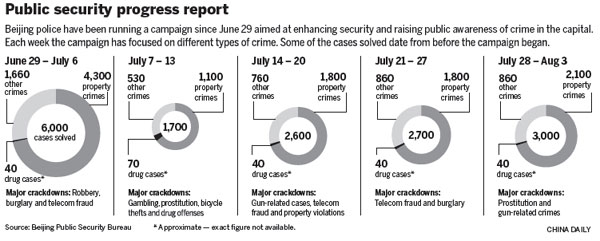"After all, it's dangerous and what they should do is to tell us information and help us keep their community secure," he said. So far, more than 120,000 Beijing Chaoyang qunzhong have worked as volunteers.
"They have been the major force to protect not only the district's security, but also the capital's," Wang added.
Beijing police have received more than 1,500 items of information relating to drugs from residents since the beginning of this year, up 65 percent year-on-year. They have also been provided with more than 800 clues about terrorists from March last year to May this year, according to the capital's Public Security Bureau.
Police campaign
Since July, a campaign aimed at building a safe city has been developed across the capital, with police calling on residents to increase security awareness.
For example, Beijing Public Security Bureau has sent several teams to areas that have a high number of traffic violations, and more police officers to areas where public disturbances are common.
In addition, the police have paid more attention to terrorism, making stricter checks in markets, gas stations and shopping areas, as well as increasing patrols in crowded places.
The police are required to release information about the safer city campaign, with the aim of giving people a sense of security, the bureau said.
In a release published in July, Beijing police said they had dealt with nearly 2,600 criminal cases and detained almost 800 suspects. They took away more than 160 drug users and had 190 people placed in administrative detention for illegally running businesses. Since the campaign started, the police have seized more than 100 guns and more than 50 kg of explosives, the authority said.
Since March 1 last year, when the authority issued a guideline on rewarding residents who provide terror-related clues, the police have received more than 800 such reports and allocated almost 400,000 yuan ($64,000) in rewards.
"We're grateful when residents assist in our work, share our burden and report in a timely manner. What we can do is give them a much safer city," said Wang.
"A safe city needs not only police, but also people from all walks of life. Better cooperation and communication is the key to reach the goal," he added.
caoyin@chinadaily.com.cn

